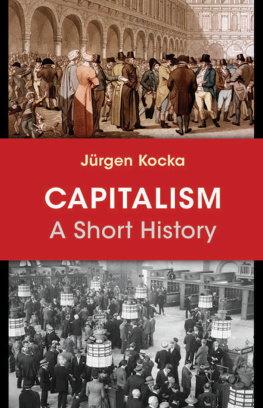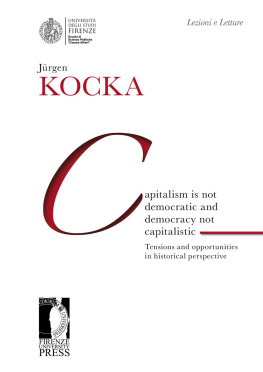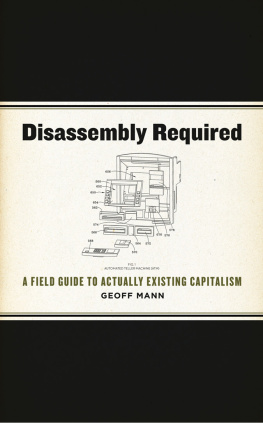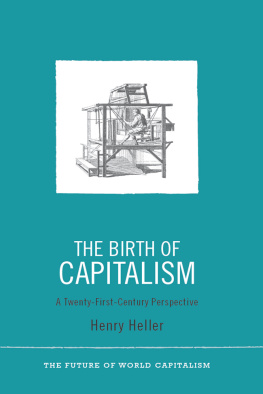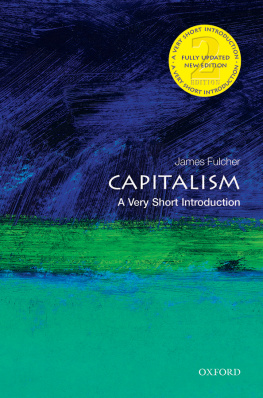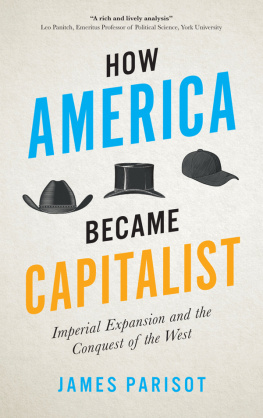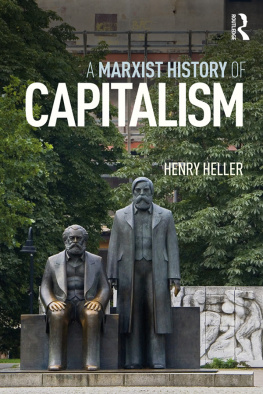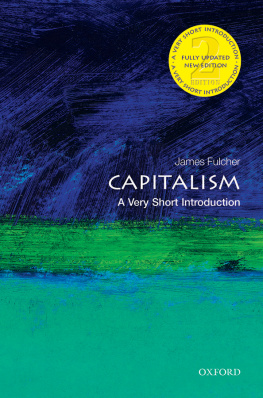Kocka - Capitalism: a short history
Here you can read online Kocka - Capitalism: a short history full text of the book (entire story) in english for free. Download pdf and epub, get meaning, cover and reviews about this ebook. City: Princeton, year: 2018;2015, publisher: Princeton University Press, genre: Politics. Description of the work, (preface) as well as reviews are available. Best literature library LitArk.com created for fans of good reading and offers a wide selection of genres:
Romance novel
Science fiction
Adventure
Detective
Science
History
Home and family
Prose
Art
Politics
Computer
Non-fiction
Religion
Business
Children
Humor
Choose a favorite category and find really read worthwhile books. Enjoy immersion in the world of imagination, feel the emotions of the characters or learn something new for yourself, make an fascinating discovery.
Capitalism: a short history: summary, description and annotation
We offer to read an annotation, description, summary or preface (depends on what the author of the book "Capitalism: a short history" wrote himself). If you haven't found the necessary information about the book — write in the comments, we will try to find it.
Kocka: author's other books
Who wrote Capitalism: a short history? Find out the surname, the name of the author of the book and a list of all author's works by series.
Capitalism: a short history — read online for free the complete book (whole text) full work
Below is the text of the book, divided by pages. System saving the place of the last page read, allows you to conveniently read the book "Capitalism: a short history" online for free, without having to search again every time where you left off. Put a bookmark, and you can go to the page where you finished reading at any time.
Font size:
Interval:
Bookmark:


Capitalism
Jrgen Kocka

Capitalism
A Short History
Translated by Jeremiah Riemer
PRINCETON UNIVERSITY PRESS
PRINCETON AND OXFORD
First published in Germany under Geschichte des Kapitalismus, by Jrgen Kocka. Verlag C. H. Beck oHG, Mnchen 2014
English translation copyright 2016 by Princeton University Press
Published by Princeton University Press, 41 William Street, Princeton, New Jersey 08540
In the United Kingdom: Princeton University Press, 6 Oxford Street, Woodstock, Oxfordshire OX20 1TW
press.princeton.edu
Jacket art: Top, Amsterdam Stock Exchange around 1800, from the Museum of American Finance. Bottom, New York Stock Exchange, early 20th century.
Courtesy of Shutterstock
All Rights Reserved
ISBN 978-0-691-16522-6
Library of Congress Control Number: 2015955567
British Library Cataloging-in-Publication Data is available
This book has been composed in ITC Stone Serif Std
Printed on acid-free paper
Printed in the United States of America
1 3 5 7 9 10 8 6 4 2
Contents
Preface to the English Edition
Capitalism is an essential concept for understanding modernity. By the same token, its history can serve as a key for explaining the most important socio-economic changes of the past. Debates about capitalism lead into discussions about the most pressing problems of the present time, ranging from globalization, the war against poverty, and climate change, through growing social inequality, to the prospects for progress and its human costs. At the same time, as a concept of historical synthesis capitalism is unsurpassed, bringing together the economic, social, cultural, and political dimensions of the past.
Capitalism is at once a tool of scholarly insight and of social critique. This dual function has made it suspicious to some but all the more interesting to others. Both functions could, but need not, stand in each others way. Over the last several decades, the concept has made a forceful comeback in both public discussions and the social sciences.
But the concept remains controversial. It is still too frequently the ill-defined component of a one-sided narrative. It can be mythologized and distorted. Ardent simplifications abound among capitalisms critics and defenders alike.
This book offers a concise overview of the genesis and controversial development of the concept, and of the history of capitalism from antiquity to the present time. It distinguishes among different types of capitalism, especially among merchant capitalism, plantation capitalism, industrial capitalism, and finance capitalism. It discusses capitalism as an engine of innovation and growth, but also as a source of crisis, exploitation, and alienation. While the capitalist record of the West takes center stage, its global dimensions and expansion are carefully reconstructed, too. Central topics include work in capitalism, market and state, as well as financialization. The book also deals with capitalism and its critique as a topic of intellectual history and of religious thought.
It is emphasized that capitalism has been highly transmutable over time, that it has flourished under very different social and political conditions, and that it can be shaped by politics and society. In this respect, the critique of capitalism has been and continues to be of outmost importance.
This introduction to the history of capitalism first appeared in German. For this edition it has been thoroughly revised, updated, and supplemented so as to make it more accessible and relevant for English-speaking readers.
Jrgen Kocka
Berlin, August 2015

Capitalism

What Does Capitalism Mean?
The Emergence of a Controversial Concept
Capitalism is a controversial concept. Many scholars avoid it. To them it seems too polemical, since it emerged as a term of critique and was used that way for decades. The term is defined in different ways, and frequently not defined at all. It encompasses a great deal, and it is hard to delineate. Would it not be better to dispense with the concept and, say, talk about a market economy?
On the other hand, there is a long line of serious-minded scholars in the social sciences and cultural studies who have contributed a great deal of substance to the discussion about capitalism. A quarter century after the end of the Cold War, which was also a war of words in which key concepts were weapons, the term has returned to the scholarly discourse with a vengeance. The international financial and debt crisis that started in 2008 has added fuel to the fire of critical interest in capitalism. We are witnessing a new boom in course offerings about the history of capitalism on American college campuses, and the number of books and articles with capitalism in the title is on the rise. In Europe, too, the concept is now more newsworthy than it has been in a long while, even if its renewed But if the term is going to be used, one should be familiar with its history and define it sharply.
The term capitalism only gained acceptance in French, German, and English, after some sporadic antecedents, in the second half of the nineteenth century, although capital and capitalist had already become part of the vernacular in those languages. Let us take German as an example: there the concept of capital migrated from the language of merchants (where it was frequently used, at the latest, by the early sixteenth century) into the terminology of the social and economic sciences that were emerging in the seventeenth and eighteenth centuries. Initially the concept meant money (either invested or lent), and then later assets consisting of money, monetary values, commercial paper, commodities, and manufacturing plant, though always in regard to the profit that it should yield (1776), instead of being consumed or hoarded.
Since the seventeenth century, capitalist stood for the capital-rich man who has cash monies and great wealth and can live from his interest and rents (1756). More specifically, those designated as capitalists include merchants, bankers, pensioners, and other persons who lend money and thus broker or deal in capital (1717). In the meantime, capitalist also stood for all those engaged in the acquisition of wealth if they accumulate the surplus of their labor, their earnings, over and above their required consumption, in order to use the surplus anew toward production and labor (1813). Starting in the late eighteenth century, moreover, capitalists were increasingly
Apart from a few early instances that did not really shape linguistic usage, the term capitalism initially reflected above all this imbuing of the term with criticism of the class society, a usage that happened just as the term started to catch on in the middle of the nineteenth century, originally in French, then also in German beginning in the 1860s, and somewhat later in England. In 1850 the socialist Louis Blanc criticized capitalism as the the appropriation of capital by some to the exclusion of others. In 1851 Pierre Joseph Proudhon condemned land on the Parisian housing market as a fortress of capitalism while advocating measures against exorbitant rents and speculation. Then, in 1867, a representative French dictionary cited the term
Next pageFont size:
Interval:
Bookmark:
Similar books «Capitalism: a short history»
Look at similar books to Capitalism: a short history. We have selected literature similar in name and meaning in the hope of providing readers with more options to find new, interesting, not yet read works.
Discussion, reviews of the book Capitalism: a short history and just readers' own opinions. Leave your comments, write what you think about the work, its meaning or the main characters. Specify what exactly you liked and what you didn't like, and why you think so.

